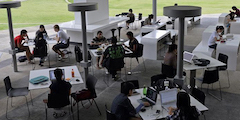Promoting Critical Thinking and Learning in a Large-Enrolment Humanities Class
A Case Study
DOI:
https://doi.org/10.20343/teachlearninqu.10.6Keywords:
multiple-choice questions, formative assessments, higher-order thinking, humanities education, informal peer learningAbstract
To promote the development of critical thinking abilities in an introductory undergraduate humanities course in the context of mass higher education, we implemented a course design that employed a series of scenario-based multiple-choice questions (MCQs) and informal peer discussions. Using an online survey to gather perception data and self-reported behavioral data, this study examines the extent to which the course design was effective at promoting critical thinking and student experience. Deductive analysis of students’ qualitative responses indicate that the course design was successful in promoting students’ development of critical thinking. Both deductive and inductive analysis of students’ qualitative responses also suggest that students largely had favorable attitudes towards this course design, though there are also some who express concerns. Our design may be useful for instructors and instructional designers aiming to promote critical thinking and learning in university courses.
References
Attride-Stirling, Jennifer. 2001. “Thematic Networks: An Analytic Tool for Qualitative Research.” Qualitative Research 1, no. 3: 385–405.
Azer, Samy A. 2003. “Assessment in a Problem‐Based Learning Course: Twelve Tips for Constructing Multiple Choice Questions that Test Students’ Cognitive Skills.” Biochemistry and Molecular Biology Education 31, no. 6: 428–34.
Biggs, John. 1996. “Assessing Learning Quality: Reconciling Institutional, Staff and Educational Demands.” Assessment and Evaluation in Higher Education 21, no. 1: 5–6.
Burbach, Mark E., Gina S. Matkin, and Susan M. Fritz. 2004. “Teaching Critical Thinking in an Introductory Leadership Course Utilizing Active Learning Strategies: A Confirmatory Study.” College Student Journal 38, no. 3: 482–94.
Butera, Fabrizio, Céline Darnon, and Gabriel Mugny. 2010. “Learning from Conflict.” In Rebels In Groups: Dissent, Deviance, Difference and Defiance edited by Jolanda Jetten and Matthew J. Hornsey 36–52. Oxford: Oxford University Press.
Calkins, Susanna, Sharisse Grannan, and Jason Siefken. 2020. “Using Peer-Assisted Reflection in Math to Foster Critical Thinking and Communication Skills.” PRIMUS 30, no. 4: 475–99. https://doi.org/10.1080/10511970.2019.1608608.
Casner-Lotto, Jill, and Mary Wright Benner. 2006. “Are They Really Ready to Work? Employers' Perspectives on the Basic Knowledge and Applied Skills of New Entrants to the 21st Century US Workforce.” Partnership For 21st Century Skills., Washington, DC.
Chi, Michelene T.H., Stephanie A. Siler, Heisawn Jeong, Takashi Yamauchi, and Robert G. Hausmann. 2001. “Learning from Human Tutoring.” Cognitive Science 25, no. 4: 471–533.
Eddy, Sarah L., Sara E. Brownell, Phonraphee Thummaphan, Ming-Chih Lan, and Mary Pat Wenderoth. 2015. “Caution, Student Experience May Vary: Social Identities Impact a Student’s Experience in Peer Discussions.” edited by Jeff Schinske. CBE—Life Sciences Education 14 (4): 45. https://doi.org/10.1187/cbe.15-05-0108.
Falchikov, Nancy. 2003. “Involving Students in Assessment.” Psychology Learning and Teaching 3, no. 2: 102–8
Felten, Peter. 2013. “Principles of Good Practice in SoTL.” Teaching & Learning Inquiry, 1: 121–25. https://doi.org/10.20343/teachlearninqu.1.1.121.
Freeman, Scott, Sarah L. Eddy, Miles McDonough, Michelle K. Smith, Nnadozie Okoroafor, Hannah Jordt, and Mary Pat Wenderoth. 2014. “Active Learning Increases Student Performance in Science, Engineering, and Mathematics.” Proceedings of the National Academy of Sciences 111, no. 23: 8410–15.
Gillies, Robyn M. 2015. “Academic Talk in the Collaborative Classroom.” In Collaborative Learning: Developments in Research and Practice edited by Robyn. M. Gillies, 141–56. New York: Nova Science.
Goodwin, Dawn, and Laura Machin. 2016. “How We Tackled the Problem of Assessing Humanities, Social and Behavioural Sciences on Medical Education.” Medical Teacher 38, no. 2: 137–40.
Hansen, Edmund J. 2011. Idea-Based Learning: A Course Design Process to Promote Conceptual Understanding. Sterling, Va.: Stylus.
Howe, Christine. 2015. “Dialogue and Knowledge Transformation: Towards a Socio-Cultural Theory of Cognitive Growth.” Paper presented at EARLI conference, Limassol, Cyprus, 3–5 August.
Hornsby, David J., and Osman, Ruksana. 2014. “Massification in Higher Education: Large Classes and Student Learning.” Higher Education 67, no. 6, 711–19. https://doi.org/10.1007/s10734-014-9733-1.
Le, Ha, Jeroen Janssen, and Theo Wubbels. 2018. “Collaborative Learning Practices: Teacher and Student Perceived Obstacles to Effective Student Collaboration.” Cambridge Journal of Education 48, no. 1: 103–22. https://doi.org/10.1080/0305764X.2016.1259389.
Moeen-uz-Zafar Khan, Badr Muhammad Aljarallah. 2011. “Evaluation of Modified Essay Questions (MEQ) and Multiple Choice Questions (MCQ) as a Tool for Assessing the Cognitive Skills of Undergraduate Medical Students." International Journal Of Health Sciences 5, no. 1: 39.
Monks, James, and Robert M. Schmidt. 2011. “The Impact of Class Size on Outcomes in Higher Education.” The BE Journal of Economic Analysis and Policy 11, no. 1.
Neumann, Ruth, Sharon Parry, and Tony Becher. 2002. “Teaching and Learning in Their Disciplinary Contexts: A Conceptual Analysis.” Studies in Higher Education, 27 no. 4: 405–17.
Nicholas, Mark C., and Chalmer E. Labig Jr. 2013. “Faculty Approaches to Assessing Critical Thinking in the Humanities and the Natural and Social Sciences: Implications for General Education.” The Journal of General Education 62, no. 4: 297–319.
Niu, Lian, Linda S. Behar-Horenstein, and Cyndi W. Garvan. 2013. “Do Instructional Interventions Influence College Students’ Critical Thinking Skills? A Meta-Analysis.” Educational Research Review 9: 114–28.
Roscoe, Rod D. 2014. “Self-Monitoring and Knowledge Building in Learning by Teaching.” Instructional Science 42, 327–51.
Scouller, Karen. 1998. “The Influence of Assessment Method on Students' Learning Approaches: Multiple Choice Question Examination Versus Assignment Essay.” Higher Education 35, no. 4: 453–72.
Scriven, Michael. and Richard Paul. 1987. Defining Critical Thinking. 8th Annual International Conference on Critical Thinking and Education Reform.
http://www.criticalthinking.org/pages/defining-critical-thinking/766.
Topping, Keith, Céline Buchs, David Duran, and Hilde van Keer. 2017. Effective Peer Learning: From Principles to Practical Implementation. Routledge, Taylor & Francis Group.
Tight, Malcolm. 2019. “Mass Higher Education And Massification.” Higher Education Policy 32, no. 1: 93–108.
Trow, Martin. 1999. “From Mass Higher Education to Universal Access: The American Advantage.” Minerva: 303–28.
Vygotsky, Lev S. 1978. Mind In Society: The Development of Higher Psychological Processes. Cambridge: Harvard University Press.
Webb, Noreen M., Jonathan D. Troper, and Randy Fall. 1995. Constructive Activity and Learning in Collaborative Small Groups. Journal of Educational Psychology, 87, 406–23.
Wiggins, Grant, and Jay McTighe. 2005. Understanding by Design. ASCD.

Downloads
Published
Issue
Section
License
Copyright (c) 2022 Kiruthika Ragupathi, Zi Hui Yeo , Hui Chieh Loy

This work is licensed under a Creative Commons Attribution-NonCommercial 4.0 International License.






